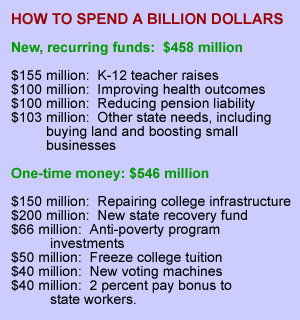
By Andy Brack, editor and publisher | The state of South Carolina has won the lottery. It has a billion dollars in surplus funds in the coming year that can be used to address generational problems left lingering for far too long.
 Let’s hope state lawmakers who let too many things get out of control because of too little money and vision don’t miss this gigantic opportunity to do a whole lot of good.
Let’s hope state lawmakers who let too many things get out of control because of too little money and vision don’t miss this gigantic opportunity to do a whole lot of good.
But in a state riddled with so many needs – we’re at the bottom in public education, college tuition is too high, more than half of state workers don’t earn a living wage and infrastructure is crumbling – how is it best to divide the money in ways that make strategic sense so the surplus isn’t just a political slush fund?
New, recurring funds
In the state’s 2019-20 budget, there will be about $458 million in new, recurring revenue stemming from the state’s growth and other sources. This is the pot of money that lawmakers usually argue over every year for new programs and additional costs that need to be funded on a recurring basis, such as health cost increases or extra pay for workers.
Perhaps the best investment for the state is to sink a large chunk of this money into the state’s teachers, who currently are paid at less than the Southeastern average. If we want more than average, we’re going to have to pay for it. Cost of a 5 percent raise for teachers: $155 million.
 Being a state with some of the worst health outcomes, the state should invest $100 million on new programs to make citizens healthier and improve access to health care. Furthermore, another $100 million should be invested annually in further reduce the $21 billion unfunded liability of pension benefits for retirees and workers. We’re going to have to pay the piper at some point to deal with this liability; we might as well continue to reduce it with new money than have to raise taxes down the road to honor the state’s pension promises.
Being a state with some of the worst health outcomes, the state should invest $100 million on new programs to make citizens healthier and improve access to health care. Furthermore, another $100 million should be invested annually in further reduce the $21 billion unfunded liability of pension benefits for retirees and workers. We’re going to have to pay the piper at some point to deal with this liability; we might as well continue to reduce it with new money than have to raise taxes down the road to honor the state’s pension promises.
Of the remaining money – about $103 million – the state should prioritize remaining needs across all agencies, including spending money on bolstering small businesses and protecting special places by buying threatened land.
One-time money
Also available to use to shore up South Carolina’s needs is a $546 million pot of one-time money from past reserve funds and surpluses. Suggested priority areas for spending include colleges, infrastructure and employees:
College infrastructure. There’s been talk of borrowing $500 million to fix old college buildings and infrastructure. Instead of borrowing the amount, spend $150 million of surplus now to modernize.
Freeze tuition. The state also could spend $50 million to freeze tuition at state public colleges and universities, which have the highest tuition in the South. This would help make college more affordable to middle-class South Carolinians.
Recovery fund. Since we now seem to have a big natural disaster every year or two, let’s start a new disaster recovery fund of $200 million to be ready in the future for the next weather-related hit.
Voting machines. South Carolina has outdated voting machines that do not inspire confidence. While $10 million has been set aside for new machines, another $40 million needs to be spent to buy 13,000 new machines that have paper trails.
Bonuses. State workers get the short end of the pay stick, year after year. Let’s spend $40 million on a one-time, 2 percent bonus.
Anti-poverty programs. The remaining one-time money – about $66 million – should be used to seed a multitude of anti-poverty efforts by nonprofits and churches dedicated to improving lives of South Carolinians at the bottom of the socio-economic scale.
Let’s not fall for the old bait-and-switch that surpluses need to be returned to taxpayers in a state that has underfunded priorities for years. If lawmakers fall prey to this ruse again, you know who will get most of the extra money – rich folks.
Let’s do the right thing and make sure lapsed needs are met. Let’s not waste this opportunity to invest the surpluses in South Carolina’s future.
- Have a comment? Send to: feedback@statehousereport.com.















 We Can Do Better, South Carolina!
We Can Do Better, South Carolina!